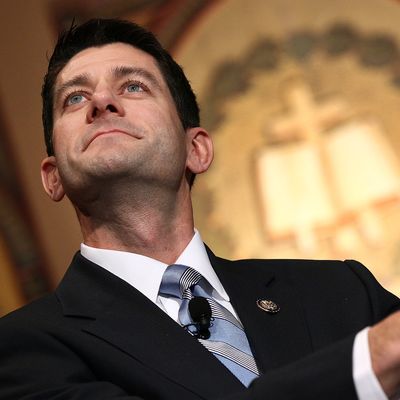
In the immediate wake of John Boehner’s chaotic resignation as House speaker and Kevin McCarthy’s chaotic withdrawal as his presumptive successor, Republican hopes have quickly fixated on the prospect that Paul Ryan might save them. After initially refusing, Ryan has reportedly softened in the face of pleas spanning the breadth of the Republican Party. “He is uniquely gifted and qualified for that position,” said South Carolina Rep. Trey Gowdy, who himself has resisted entreaties to the Speakership. California Rep. Devin Nunes has called him “the only eligible candidate.” The Wall Street Journal editorial page, oozing desperation, pleas, “Ryan may be the only Republican with the national standing and conservative credentials to defy the Cruz ultimatums.” National Review has an editorial begging him to run. Even Mick Mulvaney, a founding member of the Freedom Caucus, the founding purpose of which is to oppose everything, reportedly wants Ryan as speaker.
What makes Ryan so indispensable is the strange character of the agitas afflicting Republicans. The ideological gap between figures like Boehner and antagonists like Ted Cruz is not completely nonexistent; a world in which Boehner had unfettered power would have a radically smaller government, while a Cruz-topia would look more like Hobbes’s state of nature. In practice, though, the ideological distance between them is small; both propose to move public policy as far as possible in essentially the same direction.
What actually separates the insurgents from the Establishment is not ideology but tactics. The insurgents refuse to accept the constitutional limits of their power, and believe that more frenzied assertions of their core beliefs, combined with a periodic willingness to shut down the government and threaten a currency default, can prevail over President Obama through force of will. The insurgents mistakenly interpret disagreements over means as disagreements over ends; when Republican leaders express reluctance to shut down the government over Obamacare or Planned Parenthood, the insurgents take this as actual support for those programs.
What makes Ryan so perfectly suited to bridge this divide is that he perfectly combines ideological extremism with methodological pragmatism. He is a longtime disciple of the teachings of Ayn Rand, whom he has described as the inspiration for his entire political career. He spent the Bush years pushing the administration to adopt much larger and politically explosive proposals to cut taxes for the rich and privatize Social Security than it deemed politically viable. He greeted the Obama agenda not merely as an overreach but as a horrifying socialist dystopia that would usher in the imminent collapse of the economy.
But Ryan has never fallen prey to the illusion that Americans will accept his ideas if only the party declares them loudly enough. The Randian tradition is deeply pessimistic about democracy, dismissing most people as rubes easily manipulated into voting for candidates who will promise to steal from their economic superiors. When Ryan was catapulted in 2010 to the forefront of his party, he recast his public image, presenting himself as a reassuring accountant figure with a pragmatic interest in bipartisan compromise and fiscal probity. Ryan has consistently opposed serious compromise of the party doctrine on taxing the rich and scaling back the welfare state. But he displayed an intense pragmatism. In 2013, facing a revolt by Republican defense hawks against scheduled budget cuts, he negotiated a small compromise measure that relieved some of the budgetary pressure on the Pentagon. He managed to sell this deal to a majority of his caucus. Ryan has always understood that his chance to enact his vision of the state will only come when his party gains full control of government. The insurgent wing understands that his patience is not a delaying tactic.
No other figure within the party combines Ryan’s philosophical radicalism and tactical pragmatism. Ryan has understandable reasons to stay away from a job that, since the days of Newt, has consumed every Republican that has stepped into it. If he accepts the position, it would formalize a standing he has held for years. He is already the president of Republican America.






























